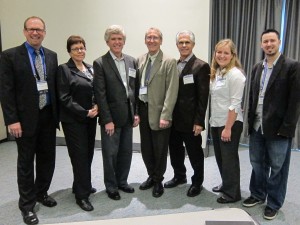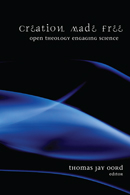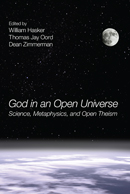The Future of Open Theology
Open theology has matured in many ways since the ground-breading publication of The Openness of God book twenty years ago. I’ve been thinking about what the next twenty years might be for open theology.
At an Open and Relational Theologies group session at the recent American Academy of Religion meeting, I joined three of the authors of The Openness of God for reflection on the book’s impact. It seemed like the right time to celebrate the 20th anniversary of the book’s publication.
I am deeply grateful to the five authors of The Openness of God: David Basinger, William Hasker, Clark Pinnock, Richard Rice, and John Sanders. The book has been powerful in my own life and in the lives of many Christians like me who were not satisfied with what Clark Pinnock called “conventional” theism.
I encountered the book not long after it was published in 1994. It confirmed many of my own intuitions, as one raised in the Arminian/Wesleyan/Holiness tradition. Since reading the book, I’ve encountered many others who after reading it said, “That’s something like what I’ve been thinking, but I thought I was the only one!”
Openness writers expressed their ideas in biblical language typical of the Christian tradition in general and my own evangelical-Wesleyan tradition in particular. And as Dave Basinger has said, The Openness of God created more space for Evangelicals like me to deny classic views of God’s foreknowledge.
Now that 20 years have passed, I’ve been thinking about the future of open theology. Of course, open and relational theists like me who think the future is not yet knowable by God should be the first to admit we don’t know what the future will be! But I want to look at the present state of open theology, as I see it, and speculate about what the future might be.
Philosophy
Open theology has made an impact in a variety of academic disciplines, schools of thought, and ways of thinking. Some of its greatest success has been in analytic philosophy circles. Thanks to the efforts of many, including two of The Openness of God authors, David Basinger and Bill Hasker, it is common for an openist philosopher to be given hearing at philosophy of religion conferences. Some do not specifically self-identify as openist philosophers, but their views of God’s relation to time and foreknowledge place them in the openist camp.
In the future, I speculate that openness ideas will continue to expand in analytic philosopher circles but grow more rapidly among theistic philosophers of religion captivated by Continentalist philosophy. Such philosophers may not embrace the label “openist” philosopher, but the fundamental drive of Continentalist philosophy, as I see it, is overturning oppressive structures, systems, and ideas. An open view fits naturally with such liberating concerns, because liberationist philosophies seem to presuppose agency, potential novelty, a measure of iconoclasm, and forward movement though time.
Liberation
Speaking of liberation, open theology seems to have enjoyed less influence among the wide swath of theological perspectives I put under the general category of liberationist theologies. Whether such theologies have gender, ethnic, or political concerns, I know only a few self-identifying openness theologians thinking through openness implications for liberationist theologies.
I think this lack of influence has more to do with the sociological and cultural positions of prominent opennist thinkers thus far and not anything inherent in liberation theology. But TC Moore is right when he talks about Open theology’s need for greater ethnic, cultural, and gender diversity.
My hunch is that the future of openness theology will be strongly influenced by liberation theologians of various types. I think this in part because of the inherent openness intuitions of liberationist thinking. I also think openness thinking will expand because of blossoming interest in liberationist theologies among peoples of diverse cultural, sexual, and political orientations.
Science
The open view of God has a strong representation in the contemporary science and theology discussion. As Bethany Sollereder has noted, openness advocates in the UK like John Polkinghorne, Keith Ward, and Arthur Peacocke are known for their denial of classical divine foreknowledge. In the U.S., prominent scholars of science and religion such as Philip Clayton, Ian Barbour, John Haught, Nancy Howell, and others deny classical foreknowledge and embrace the basic theology advanced by the Openness of God authors.
In 2007 and 2008, I co-led with Clark Pinnock and Karl Giberson some conferences on science and open theology. These events brought together for the first time many American openness thinkers with the intent was to think about openness categories in relation to science. Two books were published as a result.

What struck me most was the eagerness of openness thinkers to engage scientific issues and the general scientific endeavor. Openness theology has implicit and explicit appreciation of empiricism and epistemological realism, which I think makes open theology a natural conversation partner with contemporary sciences.
Ethics
Does open theology incline one toward a particular stance on ethics? I think it does, although I know very few who have argued this carefully.
In my view, love will be at the center of an openness ethic. So too will be the kind of moral responsibility that only comes when one believes creaturely action has genuine influence upon all others and God. An openness ethic will encourage empathy, vulnerability, listening, and suffering love.
A few have begun to ask what Openness Theology might contribute to the global crisis of our time: climate change. Sharon Harvey’s work comes to mind, as does Michael Lodahl’s. But much more must be done, at least by Evangelically-oriented open theologians.
Grassroots
I think the future of open theology will be largely shaped by those at the grass roots. General features of open theology resonate deeply with laity and pastors. The conversations occurring on the internet and in local churches give me great hope that open theology will continue spread. We must continue to ponder how we might foster, support, and encourage this aspect of open theology.
A few year ago, I joined Tom Belt and TC Moore to host the first Open Theology for the Church conference at Gregory Boyd’s church outside Minneapolis. The eagerness of those attending was palpable, as they expressed their renewed sense of passion for God and Christian living. I hope similar events will be held in the future.
As I think about the future of Open theology, I’m also drawn to reflect on its relationship with Process theology. I’ll focus an entire blog to my thoughts on that relationship in the future.
Conclusion
The future is bright for open and relational theologies. Momentum is strong, and the possibilities are diverse. I pray that those of us persuaded by this general view of reality will follow God’s wise leading into the open future.
The future is bright for open and relational theologies. Share on X
Comments
[…] From Thomas J Oord’s latest post, The Future of Open Theology: […]
I can appreciate the study of Theology, and for diversity in Theology, there are many perspectives. However, even those persuaded by an “open reality” cannot truly follow “God’s wise leading into the open future”- in open theism, God has no more wisdom, knowledge, or understanding of the future than any other.
I would actually like to see a discussion of Open Theism at NNU with those that support Open Theism and those that do not support it. Maybe John Frame? I think that Tom Oord and John Frame would be a great discussion. And, insightful too!…
I’m not sure the open theology camp would agree with you that God cannot express His immunible characteristics of wisdom, knowledge or understanding. Further I doubt they would agree that God has not accumulated knowledge existing within all potential and past potential timelines or that His complete and vast wisdom, undestanding and knowledge are not inherent within the potentialities of creation designed and supported by Him.
Thanks for your response, Karen. I’m not sure I understand your post. But you seem to be thinking that I deny God expresses wisdom, knowledge, and understanding. But I affirm this. And most open theologians I know affirm it too. I’m sorry if I wasn’t clearer.